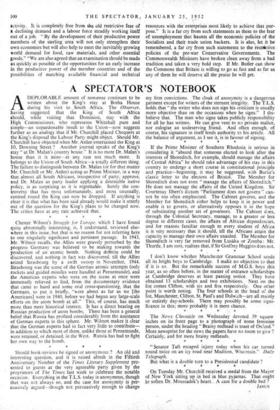Chester Wilmot's Struggle for Europe, which I have found quite
abnormally interesting, is, I understand, reviewed else- where in this issue, but that is no reason for not referring here to one singularly significant and pertinent passage. In 1943, Mr. Wilmot recalls, the Allies were gravely perturbed by the progress Germany was believed to be making towards the production of an atomic bomb. Nothing definite could be discovered, and nothing in fact was discovered, till the Allies seized Strasbourg by a swift swoop in November, 1944. Strasbourg was the scene of the Gerthan atomic attempts (only rockets and guided missiles were handled at Peenemunde), and the American experts who were on the scene at once were immensely relieved to find, from the documentary evidence that came to hand and some oral cross-questioning, that the Germans, to put it briefly, "were about as far as we [the Americans] were in 1940, before we had begun any large-scale efforts on the atom bomb at all." This, of course, has much more than mere historical interest. It has a direct bearing on Russian production of atom bombs. There has been a general belief that Russia has profited considerably from the assistance of German experts in this sphere. Mr Wilmot makes it clear that the German experts had in fact -very little to contribute— in addition to which most of them, unlike those at Peenemunde, were retained, or detained, in the West. Russia has had to fight her own way to the bomb.


































 Previous page
Previous page